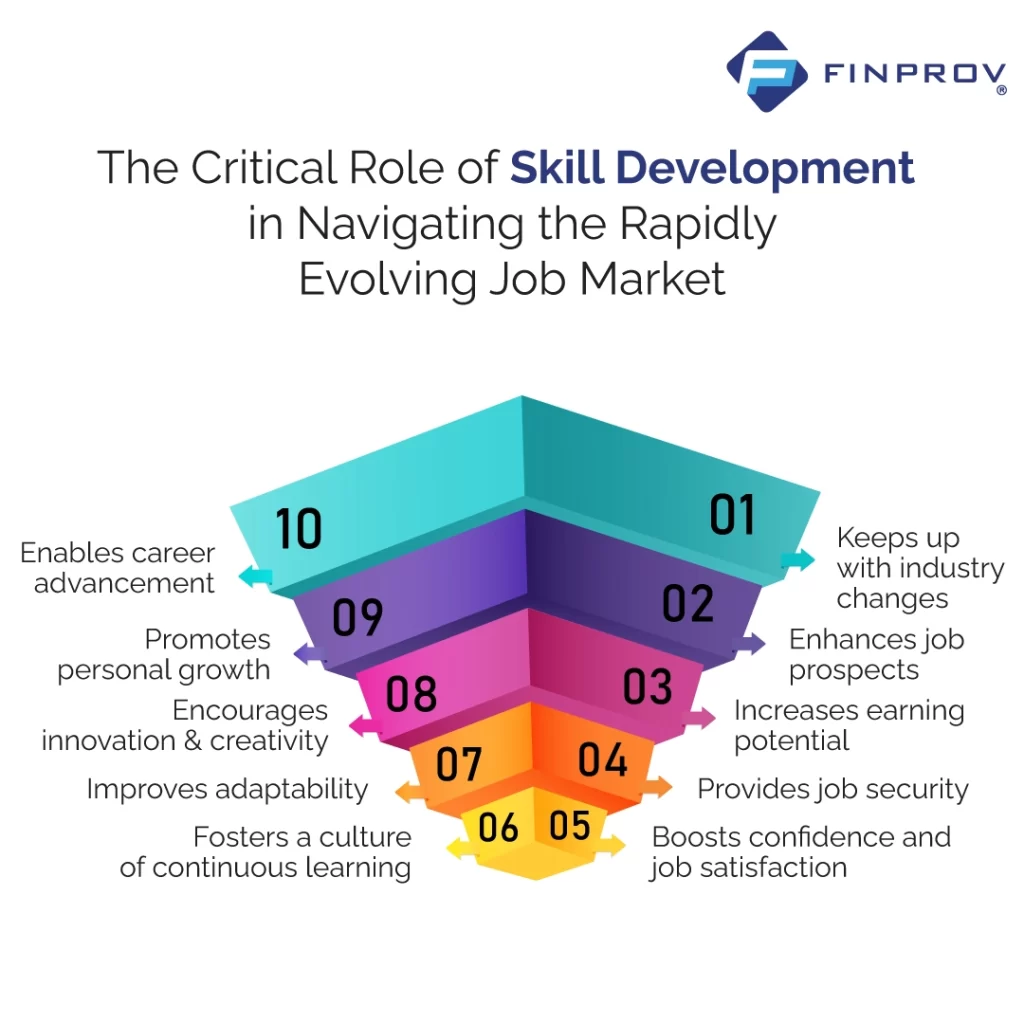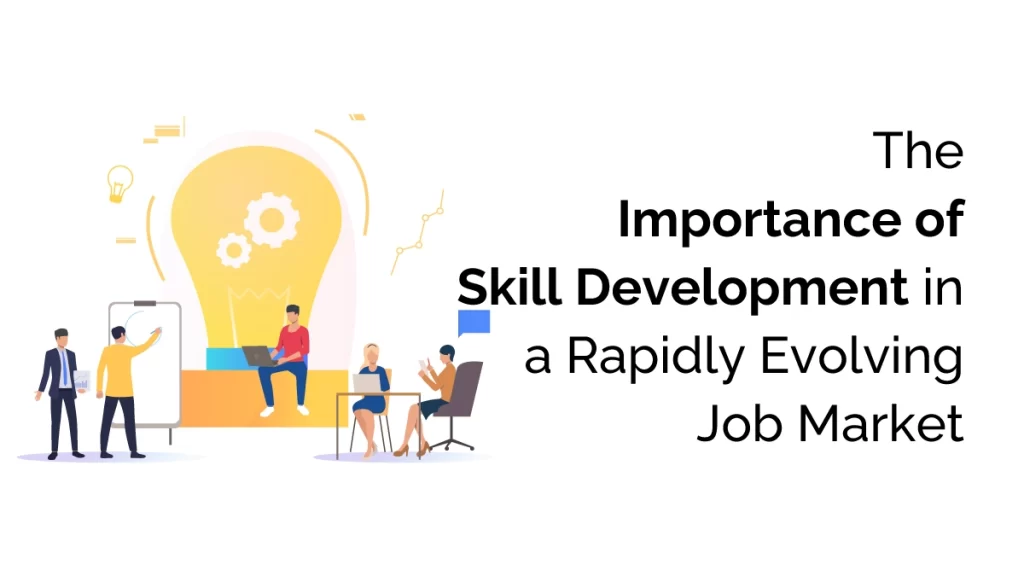As the world around us continues to change rapidly, so does the job market. With new technologies and industries emerging all the time, staying up-to-date with the skills and knowledge needed to succeed in your career is more important than ever. But how do you keep pace with this rapidly evolving landscape?
As industries change and new technologies emerge, employees must continuously acquire new skills and knowledge to remain relevant and competitive. This is particularly important in countries like India, where there is a significant skill gap between the demand for skilled workers and the supply of trained professionals. The skill gap in India presents a major challenge to the country’s economic growth and development. This highlights the critical need for skill development programs to bridge this gap. In this context, it is crucial for individuals, organizations, and governments to prioritize skill development initiatives that can equip the workforce with the necessary skills to thrive in the ever-changing job market.
Over 75% of the country’s graduates are unemployed due to a lack of skills, making the skill gap one of the major issues in independent India. While we have many computer engineers, mechanical engineers, and graduates in different fields, the number of students who get jobs in their respective fields is comparatively low, despite the increasing number of job markets. According to the International Labour Organization (ILO), another concerning fact is that India needs to develop new skill development and lifelong learning ecosystems. Skill development plays a major role in the Indian economic system. Thus, educational institutions and organizations should incorporate the most rewarding skill development training.
The Power of Skill Upgrading: The Story of Tom’s Career Growth
Once upon a time, a man named Tom had been working in the same job for many years. He enjoyed his work, but he felt like he had hit the ceiling in terms of his career growth. He realized that he needed to upgrade his skills to advance further.
So, he decided to apply for a new position at a different company that would challenge him and allow him to learn new things. He was excited when he got called in for an interview, but during the interview, he stumbled over his answers and failed to impress the hiring manager.
Tom was disappointed, but he didn’t give up. He knew he needed to improve his skills and become a better candidate for future job opportunities. So, he enrolled in a training program to learn new skills related to his field of work. He worked hard and applied what he learned to his job. His colleagues and supervisors noticed his newfound expertise and praised him for his efforts. Soon, Tom became a go-to person in his department for complex projects and problem-solving.
One day, Tom received an unexpected call from the company he had interviewed with earlier. They had a new opening that they thought would fit him well. Tom was more prepared and confident this time, thanks to his skill-upgrading efforts. He aced the interview and got the job.
Tom’s career took off from there. He continued to upgrade his skills and took on increasingly challenging roles. He eventually became a leader in his industry, mentoring others and helping them to develop their skills.
The lesson is that skill upgrading is a lifelong journey, and setbacks are just opportunities to learn and grow. With determination and hard work, we can overcome our initial disappointments and achieve great success in our careers.
The Importance of Skill Development in Navigating the Rapidly Evolving Job Market
Let’s look into why skill development plays an importance in navigating the changing landscape.

Keeps up with industry changes
In today’s job market, industries are constantly changing due to technological advancements and shifts in consumer behaviour. Skill development allows individuals to keep up with these changes and adapt to new trends and practices. This helps them stay relevant and competitive in the job market.
Enhances job prospects
Employers are always looking for candidates with the right skills and experience. Upgrading your skills and knowledge can increase your chances of landing a job or getting promoted within your current organization. It can also open up new opportunities in different industries and roles.
Increases earning potential
Upgrading your skills can increase your earning potential and negotiate better salaries and benefits. As the demand for certain skills increases, so does the value of those skills. This is particularly true for high-skilled technology, finance, and healthcare jobs.
Boosts confidence and job satisfaction
Investing time and effort into developing your skills makes you more confident in your abilities. This can lead to increased job satisfaction and a sense of accomplishment. It can also improve your performance and productivity, leading to better job performance and recognition.
Provides job security
In a rapidly evolving job market, it’s essential to have a diverse skill set to remain competitive. By upgrading your skills, you become a more valuable employee, making it less likely for you to be replaced during times of economic uncertainty or company restructuring.
Enables career advancement
Skill development is crucial for career advancement. It allows you to take on new and challenging roles within your organization or industry, leading to increased responsibility, influence, and rewards.
Promotes personal growth
Learning new skills and knowledge can be a rewarding experience that promotes personal growth and development. It allows individuals to broaden their perspectives and explore new interests, which can lead to new career paths and opportunities.
Encourages innovation and creativity
Skill development can encourage innovation and creativity. By learning new skills, individuals can approach problems and challenges differently, leading to more innovative solutions and approaches.
Improves adaptability
The ability to adapt to new technologies and practices is essential in a rapidly evolving job market. Upgrading your skills makes you more adaptable and better equipped to handle new challenges and opportunities.
Fosters a culture of continuous learning
Skill development fosters a culture of continuous learning within organizations. By encouraging employees to upgrade their skills, organizations can stay ahead of the curve and adapt to changes in the market.
All of these factors indicate that Investing in skill development is beneficial not only for individuals but also for organizations, industries, and the economy as a whole. The exposure gained through skill development is vast and can positively impact your career opportunities. To upgrade your skills effectively, you need access to high-quality training programs that provide you with the most efficient skills. This is where Finprov comes in – as a top ed-tech platform, it offers a range of courses to help you upskill and become a more demanded professional.
Through Finprov, you can acquire efficient training that will help you increase your value as a professional. Finprov offers professional skill training in time management, personality development, leadership qualities, interview skills, official communication, and language lab techniques for improving English. In addition to this training, we offer industry-specific training in Tally Prime, Gulf VAT, Income TAX, GST, SAP FICO, and more. These courses will help you upgrade your skills in the accounting and finance industry and become a more valuable professional. Along with that, Finprov offers a valuable PG Diploma course in Digital Marketing and E-commerce certification program for those looking to improve their digital marketing skills.
Practical experience is crucial in your upskilling journey, which is why Finprov’s practical-oriented training with real case examples will help you stay up to date with the industry. It’s important to continue to improve yourself with each step of your career journey. And Finprov will be there to support you with effective mentorship and abundant learning resources.










